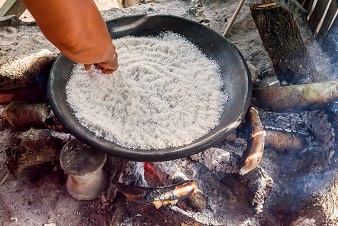Fortified food to boost African diets

date: 23/06/2015
Project: Novel staple food-based strategies to im...
acronym: INSTAPA
See also: CORDIS
Evidence from the project, which ended in November 2013, shows that fortifying staple foods with iron improves children’s cognitive development. This helped convince Kenya’s Bureau of Standards to update its regulations on wheat and maize flour, says INSTAPA coordinator Inge D Brouwer of the Netherlands’ Wageningen University.
She says that the case for mass fortification was further strengthened by a trial in the project which showed that fortifying food with iron has no strong impact on malaria risk for expectant mothers taking antenatal iron supplements (the excess iron in the blood is thought to attract malaria-carrying parasites), while it increases new-born birthweights .
In Nigeria, vitamin-A-rich forms of cassava studied during the project are being promoted to farmers by national and international organisations. Unlike white cassava – an African staple poor in nutrients – selectively-bred yellow cassava strains contain vitamin A in a form that people absorb well, the project found.
Delivery models for the yellow cassava are designed, through the HarvestPlus programme, to avoid harming local markets, says Brouwer, and the strains are not subject to intellectual property restrictions. A new project in Nigeria – CASSAVITA II – will continue to test how well yellow cassava improves people’s vitamin A levels.
INSTAPA researchers have also been invited to take part in the US National Institute of Health’s “Iron Week” summit in May 2015 to contribute to discussions about improving iron nutrition worldwide. Adds Brouwer: “The strong evidence we have built up on improving staple food can convince policy-makers to invest in this work.”
